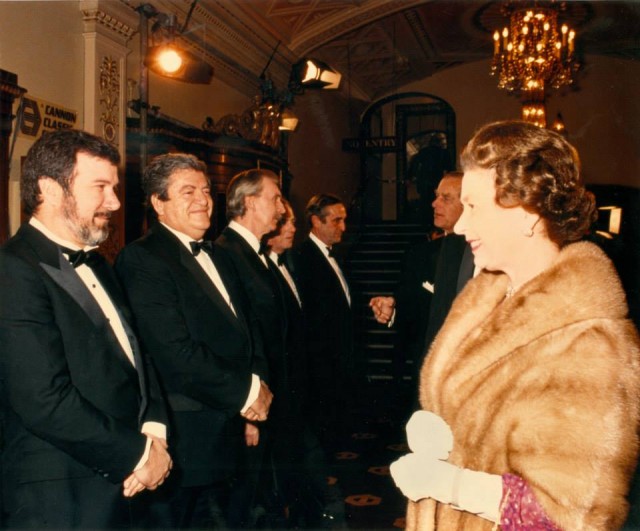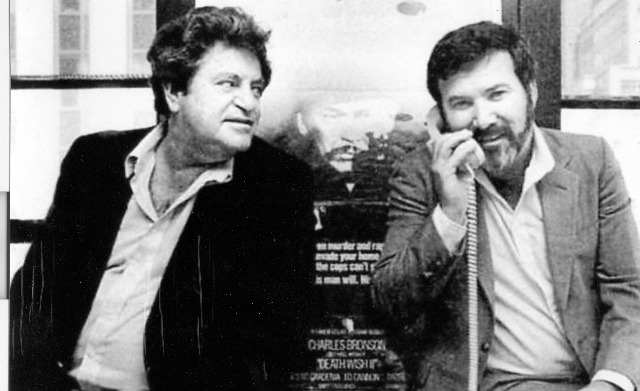THE GO-GO BOYS: THE INSIDE STORY OF CANNON FILMS (Hilla Medalia, 2014)
Film Society of Lincoln Center, Walter Reade Theater
165 West 65th St. between Eighth Ave. & Broadway
Thursday, January 29, 1:00 & 6:15
Festival runs through January 29
212-875-5050
www.filmlinc.com
www.facebook.com
 At the beginning of The Go-Go Boys: The Inside Story of Cannon Films, director Hilla Medalia asks Menahem Golan, “How do you become a filmmaker?” He answers, “Don’t do anything else.” For most of his life, that is exactly what Golan did. He started out making movies as a kid, then went into business with his cousin, Yoram Globus. The Israeli dynamic duo formed quite a pair, Golan the outgoing, bombastic, viciously driven writer, director, and producer, Globus the behind-the-scenes moneyman and dealmaker. The Go-Go Boys documents their careers as they first succeed in Israel with such movies as Eldorado and Sallah Shabati, the latter starring Topol and earning an Oscar nomination for Best Foreign Language Film, then setting off to take over Hollywood, where in 1979 they bought Cannon Films, specializing in the rapid-fire release of low-budget schlock and exploitation pictures. All told, Golan and Globus made more than two hundred films, from Death Wish II with Charles Bronson and American Ninja with Michael Dudikoff to Missing in Action and The Delta Force with Chuck Norris and New Year’s Evil with Roz Kelly, from King Solomon’s Mines with Richard Chamberlain and Sharon Stone and The Last American Virgin to John Cassavetes’s Love Streams and John Derek’s Bolero with Bo Derek. Golan and Globus are perhaps most well known for their biggest failures: The Apple, considered one of the worst films ever made; Over the Top, in which they overspent and overreached with Sylvester Stallone in a misguided mess about arm wrestling; and Superman IV: The Quest for Peace, which led to their ultimate downfall.
At the beginning of The Go-Go Boys: The Inside Story of Cannon Films, director Hilla Medalia asks Menahem Golan, “How do you become a filmmaker?” He answers, “Don’t do anything else.” For most of his life, that is exactly what Golan did. He started out making movies as a kid, then went into business with his cousin, Yoram Globus. The Israeli dynamic duo formed quite a pair, Golan the outgoing, bombastic, viciously driven writer, director, and producer, Globus the behind-the-scenes moneyman and dealmaker. The Go-Go Boys documents their careers as they first succeed in Israel with such movies as Eldorado and Sallah Shabati, the latter starring Topol and earning an Oscar nomination for Best Foreign Language Film, then setting off to take over Hollywood, where in 1979 they bought Cannon Films, specializing in the rapid-fire release of low-budget schlock and exploitation pictures. All told, Golan and Globus made more than two hundred films, from Death Wish II with Charles Bronson and American Ninja with Michael Dudikoff to Missing in Action and The Delta Force with Chuck Norris and New Year’s Evil with Roz Kelly, from King Solomon’s Mines with Richard Chamberlain and Sharon Stone and The Last American Virgin to John Cassavetes’s Love Streams and John Derek’s Bolero with Bo Derek. Golan and Globus are perhaps most well known for their biggest failures: The Apple, considered one of the worst films ever made; Over the Top, in which they overspent and overreached with Sylvester Stallone in a misguided mess about arm wrestling; and Superman IV: The Quest for Peace, which led to their ultimate downfall.

Israeli cousins Menahem Golan and Yoram Globus sought to become the kings of Hollywood — and did for a while
Both Golan and Globus sit down for new interviews with Medalia, who also speaks with Joel Silberg, whose Breakin’ firmly established the duo as real players; Israeli actors Yehuda Barkan (Lupo Goes to New York) and Yehoram Gaon (Kazablan), who share funny vignettes about working with them; director Boaz Davidson (Lemon Popsicle), who says, “They were the Israeli Hollywood”; director Andrei Konchalovsky and actor Jon Voight, who made Runaway Train, which tallied three Oscar nominations; Jean-Claude Van Damme (Bloodsport), who talks about crying in front of Golan while trying to get a job; and writer-director Eli Roth, who discusses the influence of their work on him. Medalia also meets with members of Golan and Globus’s family, as their wives and children relate stories about the pair’s utter dedication to cinema, often at the expense of being around. But as Globus’s son Ram says, “They completed one another. It was a train that couldn’t be stopped.” The film is a bit of a rehashed mishmash; even at a mere eighty-five minutes, it is overloaded with old interviews and entertainment segments; although it’s fun seeing some of Ed Bradley’s 60 Minutes report on how Golan and Globus took over the Cannes Film Festival — where, appropriately enough, The Go-Go Boys premiered, in May 2014 — far too much of the TV program is shown. The documentary also doesn’t delve quite deep enough into how really bad so many of their pictures were, giving their stunning low quality relatively short shrift. When Medalia says to Golan, who passed away last summer at the age of eighty-five, “I want to hear about the failures,” he responds quite defiantly, “There were none.” The Go-Go Boys is screening at the New York Jewish Film Festival on January 29 at 1:00 and 6:15 at the Walter Reade Theater; the twenty-fourth annual festival continues through that night with screenings and special events at the Film Society of Lincoln Center and the Jewish Museum.
